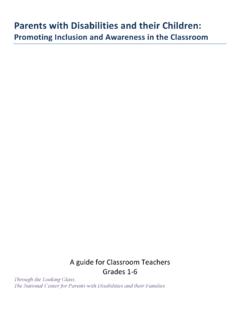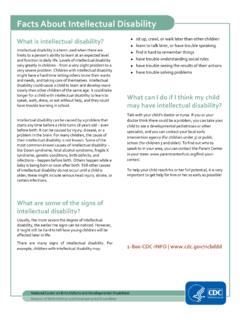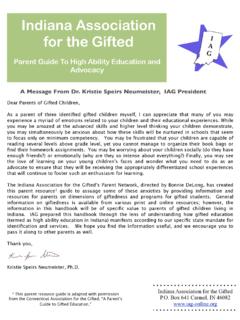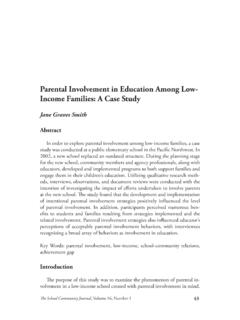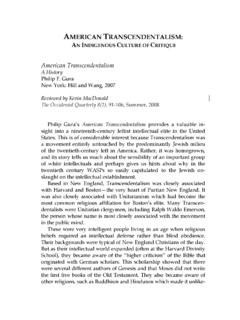Transcription of What Works for Parents with Learning Disabilities? – Summary
1 Abc 1 What Works for Parents with Learning disabilities ? Summary Author: Susan McGaw Report Published: 2000 The 'What Works ?' series Some ways of dealing with problems work better than others. Every child has the right to expect that professionals intervening in their lives will do so on the basis of the best available knowledge. But the majority of interventions in social care are not evaluated before they are introduced. In that sense, much of the work done with children is an uncontrolled experiment.
2 Barnardo s has a special interest in evidence-based practice, that is, finding out what Works , and ensuring that the interventions we and others make in children s lives are as good as they possibly can be. As Roy Parker and his colleagues have pointed out: A hundred years ago, the benefits of providing separate care for deprived and disadvantaged children were thought to be self evident. It has since become increasingly apparent that unless outcomes in childcare can be adequately measured, we have no means of justifying the actions of social workers, which may have far reaching and permanent consequences for individuals.
3 ' Qualitative work, and user studies, for which the UK has a good record, are important in understanding the processes which enable interventions to work well, and understand what service users most value. They do not, however, help us to know what interventions work best, or why. In order to understand cause and effect - the relationship between a particular intervention and an outcome - randomised controlled trials are important. RCTs in the UK and North America include studies of day care, home visits, accident prevention, and other early childhood interventions.
4 The cohort studies, such as the National Child Development Study (NCDS) enable us to see who does well after a poor start in life, and understand what factors may lead to resilience. Barnardo's What Works reports draw on a range of research designs and evaluations which suggest that particular interventions are worthwhile. abc 2 This report in brief Attitudes to Parents with Learning disabilities have changed considerably in recent decades. There is much more acknowledgement than before that while many such Parents face specific and challenging problems, they remain Parents , with the same hopes and fears as others.
5 What Works for Parents with Learning disabilities is a review of what we know about the most effective ways of providing support. It draws on empirical evidence and research to establish a knowledge base for practitioners and those charged with developing services. The report falls into six parts: A general discussion about Learning disability and parenting. Why Parents with Learning disabilities are of concern to health and social care services Ways of assessing families. Ways of intervening What is known about effectiveness Current service issues Learning disability and parenting: general comments The primary task of health and social care services is to provide Parents with Learning disabilities with the support they need in order to care adequately for their children.
6 As with all child care practice, the welfare of the child remains paramount and must precede any consideration of parental rights. Parents rights and children s welfare are best supported through a combination of positive attitudes and evidence-based practice. While a precise division cannot be made between Parents who are and who are not affected by Learning disabilities , Parents with Learning disabilities share many common needs. Service providers need to be wary of the argument that all Parents should be treated alike and offered the same services as the mainstream population.
7 A specialised response is often required. Many health and social care services do not feel they are equipped to deliver this response. abc 3 Why Parents with Learning disabilities are of concern to health and social care services Work with Parents with Learning disabilities is challenging. American studies report that as many as 50% of their children are estimated to be at risk from abuse/neglect and 25% may be taken into care. Some families are so vulnerable that no single agency can address all their needs.
8 Support services can feel overwhelmed by the demands placed on them, which in turn can leave families suspicious of health and social welfare services, fearing in particular that their children will be taken into care. Despite the vulnerability of both Parents and children, there are few support services for Parents with Learning disabilities and a lack of specialist training for professionals. Often the strengths of the Parents remain unidentified and basic information about whether they need help with , for example, reading, writing or counting is unknown.
9 Research suggests that: There is evidence for a genetic link between parental Learning disability and child developmental delay. Where families do not get enough support, any genetic vulnerability to development delay may be compounded by lack of environmental stimulation. Behavioural problems, particularly in boys, and corresponding difficulties in parental management may arise when the child s intellectual capacity exceeds that of their Parents . Parents with Learning disabilities are more likely than the general adult population to have been abused as children.
10 Adults with IQs below 60 are unlikely to be able to parent adequately unless they receive effective support. The main predictor of adequate parenting is a firm structure of informal and formal support. Inadequate parental support includes untrained staff using interventions designed for other populations, confused multiple agency involvement, no parenting models, no parent support or a husband/partner with an emotional disorder who is abusive. A lack of friends, neighbours, family and community may be even more disabling.










